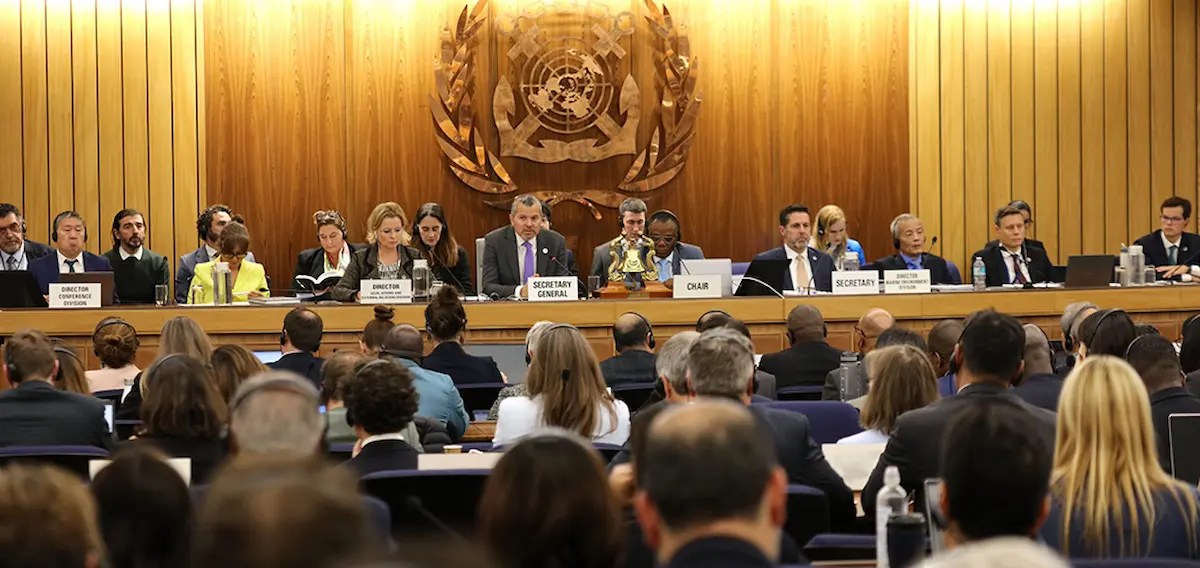
Following the extraordinary meeting of the Marine Environment Protection Committee (MEPC) held in London from 14-17 October 2025, the International Maritime Organization’s (IMO) long-awaited discussions on the proposed Net-Zero framework have been put on hold for another year.
A year late at a critical moment for marine decarbonization
The IMO MEPC meeting was originally convened to consider the adoption of draft amendments to MARPOL Annex VI, in particular the new Chapter 5 – the IMO Net Zero Framework.
This framework is the cornerstone of the Organization’s 2023 Strategy to Reduce Greenhouse Gas (GHG) Emissions from Ships, which aims to align international shipping with global climate goals.
However, after days of intense negotiations, member states failed to reach consensus on key components of the framework, leading to the decision to postpone negotiations for twelve months.
This followed protests, whispers, public condemnations, and outright naming of the Net-Zero framework, by the US State Department, which called it a “A global carbon tax.”“and”“An environmental agreement that unfairly or unjustly burdens the United States or harms the interests of the American people.” and several Greek shipowners who called it “unrealistic” and “disconnected from the commercial realities of global trade”.
The extraordinary session will reconvene in October 2026, giving governments more time to close gaps on a proposed global fuel standard and the introduction of a global emissions pricing mechanism.
Work continues at the interim level
Despite the postponement, progress will continue at the technical level. The Intersessional Working Group on Reducing Greenhouse Gas Emissions from Ships, scheduled for October 20-24, 2025, is proceeding as planned.
The group will focus on developing implementation guidelines and refining elements of the proposed Net-Zero Framework to prepare for final adoption.
IMO’s Net-Zero Framework, first adopted in principle at MEPC 83 in April 2025, represents a landmark step in marine climate policy.
It is the first time the organization has developed a comprehensive regulatory architecture to reduce greenhouse gas emissions in the global fleet, combining a global fuel standard with a market-based carbon pricing system.
If approved, transportation would become the first industry sector to operate under a globally agreed carbon pricing regime.
Industry reaction: Disappointment and demand for transparency
The International Chamber of Shipping (ICS), which represents more than 80 percent of the world’s merchant fleet, expressed frustration at the lack of consensus among IMO member states.
In a statement, Thomas A. ICS Secretary General Kazakos said:We are disappointed that the member states could not reach an agreement in this meeting. Industry needs clarity to make the investments needed to decarbonize the maritime sector in line with the targets set out in the IMO GHG Strategy.
As an industry, we will continue to work with the IMO, which is the best organization to provide the global regulation needed for a global industry.“
ICS and other industry groups have consistently emphasized that regulatory uncertainty is delaying investment in alternative fuels, ship retrofits and carbon reduction technologies.
Shipowners and charterers seek clear and predictable global rules to avoid complex regional measures that can disrupt international trade and increase compliance costs.
The way forward: Consensus or continuation of fragmentation..??
The next twelve months will be crucial for the credibility of the IMO and the decarbonisation trajectory of the maritime industry.
Delays at the IMO could exacerbate regulatory disputes as the EU’s emissions trading system expands to include shipping and other areas that are reviewing their own carbon pricing framework.
Stakeholders will closely observe the progress of the international group in its technical work and the resumption of political negotiations next year.
Currently, the shipping industry is committed to the IMO process, but its patience is clearly being tested.